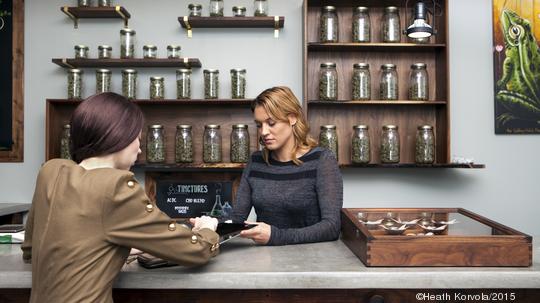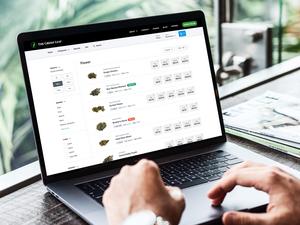
Dutchie has leveraged a chunk of its $600 million in venture funding to add a cashless payment component to its cannabis commerce offerings.
The system, called Dutchie Pay, was an expected next step for the Bend startup in an industry where “cash is still king,” as co-founder and chief product officer Zach Lipson put it.
That’s because federal prohibition has left banks hesitant to handle cannabis transactions, making credit cards off-limits and debit-card use sketchy.
Cash is a security nightmare for dispensaries, which have been frequent targets of often violent robberies. It can also translate to added costs, reduced employee productivity and accounting errors — and, it seems, lower sales than might otherwise be realized.
In Dutchie Pay testing, the average transaction was up around 30%, Lipson said.
“People don’t get to checkout and potentially see that the dispensary only accepts cash,” he said. “They have an easy, visual way to pay for their order.”
An ACH-based payment system
Dutchie’s payment solution, which so far is available only for online purchases, isn’t unique. It uses the Automated Clearing House Network, known as ACH, which allows for direct movement of money from one bank to another. The same system is used for direct deposits and bill paying. To use it, consumers need to initially provide their bank account information, the same way they would for PayPal or Venmo.
A lot of companies offer similar services to the cannabis industry. Dutchie’s potential advantage — and a key selling point to retailers — is that Dutchie Pay can be integrated with its existing e-commerce and point-of-sale offerings to create a seamless system for consumers and retailers.
Dutchie says some 5,500 dispensaries use some form of its technology.
Lucky Lion, an Oregon retailer with three shops in the Portland area and one in Eugene, uses Dutchie e-commerce and the Greenbits point-of-sale technology that Dutchie acquired last year. It demoed Dutchie Pay, co-owner Stephen Horton said, but hasn’t bought into the service yet.
“The fees are a little higher than another solution we’re trying,” Horton said. That’s a system from a company called Bankcard International Group. “They swear up and down they are compliant,” Horton said.
That’s a common claim in the murky world of noncash cannabis payment services.
One popular method has been “cashless ATMs.” These are terminals where customers run their bank card and enter their PIN. But instead of spewing out cash, the terminal prints a voucher that the customer gives to the merchant. In the background, a “withdrawal” is transferred to the merchant’s account.
Visa, for one, has warned that the “scheme” — the term it used — violates its rules.
“There are a lot of people with a lot of solutions, but I don’t know that anyone has solved the puzzle,” Horton said. “Whoever can will do really well.”
SAFE Banking would fix things
That is, until cannabis is legalized federally — or, at least, banking reform is adopted. The House has passed a version of the Secure and Fair Enforcement Act more than a half-dozen times, but the Senate has yet to come aboard.
There have been suggestions that could hurt Dutchie by opening the cannabis commerce field to big mainstream players. Lipson rejected that idea.
“We want to see normalization in this space,” he said.
Lipson also brushed aside recent reports that some Dutchie investors were looking to get out of the company at a valuation well under the $3.7 billion that was attached to a $350 million funding round just last fall. A layoff round last month, comprising 8% of the 700-plus workforce, fueled that talk.
“The company is in a strong position,” Lipson said. “We’re continuing to see growth month by month and frankly any reports that our valuation has change are false. We’re in a healthy position and we’re taking big, new exciting products to market, with more to come.”








